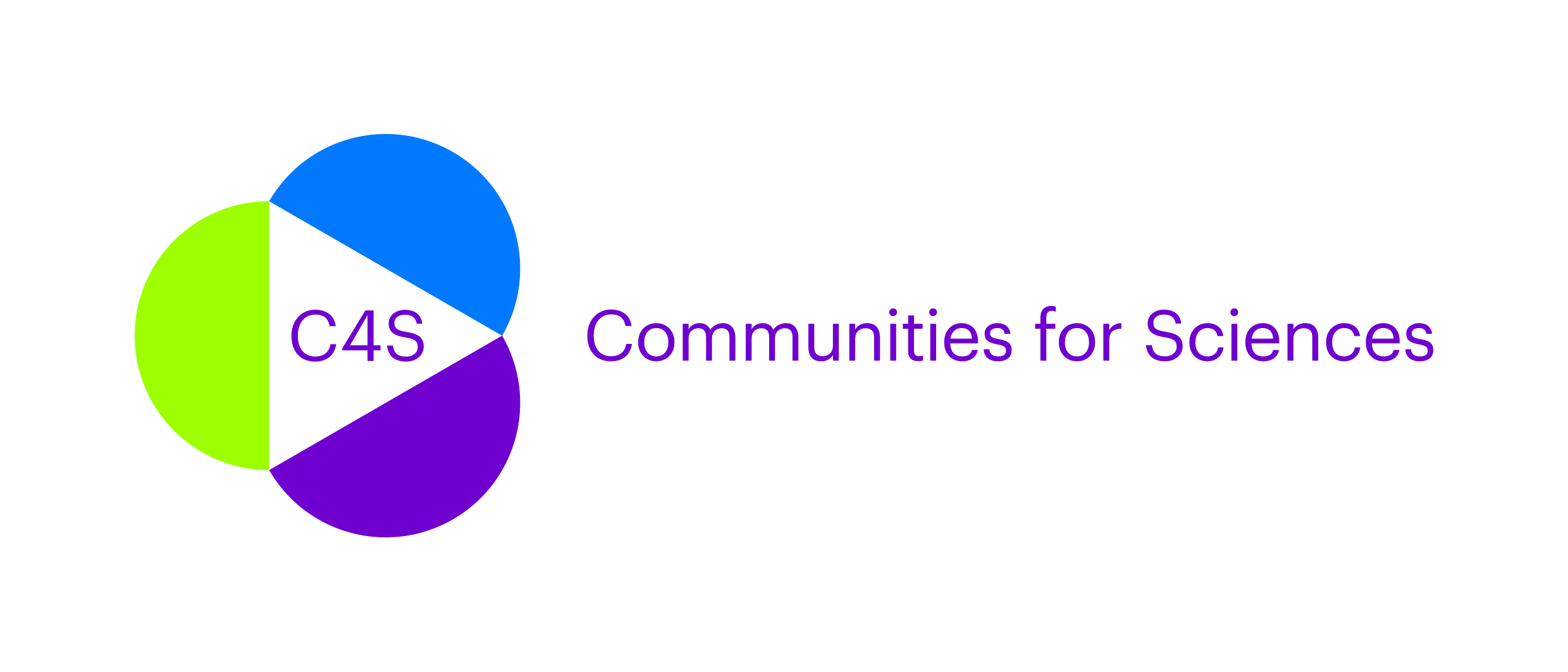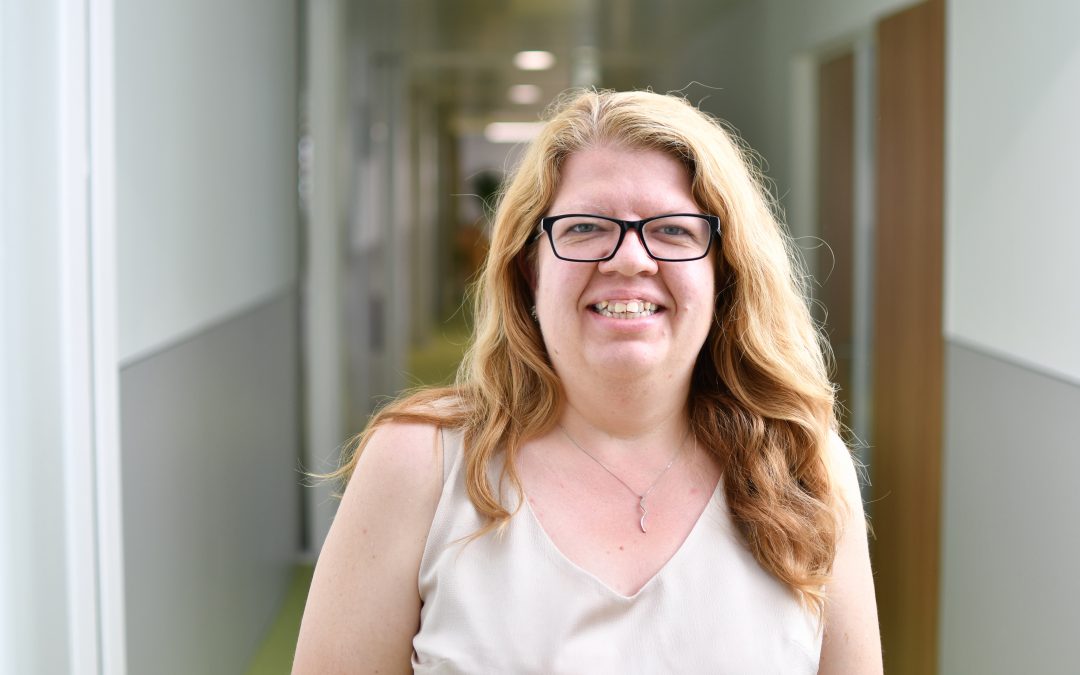
by Àngels Fusté | juny 29, 2022 | General
Since last June, Lyudmyla Kokorina is part of the “Communities for Sciences – Towards promoting an inclusive approach in science education” (C4S) project as a research assistant through the European Commission’s Horizon for Ukraine programme. Lyudmyla has a PhD in “General Pedagogy and History of Pedagogy” and worked in Horlivka Institute for Foreign Languages of State Higher Educational Institution Donbas State Pedagogical University since 2007.
How and why were you incorporated in the “Communities for Sciences – Towards promoting an inclusive approach in science education” (C4S) project?
I wish I knew the exact answer. Probably, it’s just the very moment when everything centred and focused on the project and me forming a part of it. The situation in Ukraine forced me to leave home for the second time and go abroad searching for safety. And thus, become one of the millions of Ukrainian job-seekers. Later, the project coordinators read my CV, appointed an interview, and made their decision. And now I’m being interviewed as a new member of the C4S team. I think that my professional competencies and work experience can add to the project and bring a view from a new perspective. All C4S members have proved to be a great team in creating, supporting, and promoting tools for successful Inclusive Science education at all social levels.
Did you know about the C4S project before?
Frankly speaking, I didn’t know about the project before. But now I’m glad to be a part of it since I had some experience with non-discrimination education and inclusiveness. Together with the students, we practised research tools on the social attitude towards inclusion in Ukrainian schools.
What do you do as a research assistant at C4S? Is it like what you did in your country?
The tasks are rather different but very interesting. First, I had to learn some more about the idea and details of the project by studying articles and opinion essays about the research area. And then I naturally joined the observations and further activities of data collecting and processing. Considering my work in Ukraine I was more involved in the daily routine of institutional administrating and teaching classes. And my research area was mainly from the perspective of foreign language teaching and comparative pedagogy.
You are an expert in Pedagogy. How do you think we can contribute to the improvement of educational inclusion processes in the classroom?
I never considered myself to be an expert, but what I believe is that a person should never cease doing good things. Therefore, the best way to contribute to enhancing inclusive education is to continue rolling out inclusive education at all stages of education and involving more people in its implementation. Luckily, I had the possibility to observe inclusive science education “in action”. Now I’m sure that it really functions because when a teacher inspires his/her pupils, they strive for knowledge and discoveries. Just like in my favourite quote from William Arthur Ward: “The mediocre teacher tells. The good teacher explains. The superior teacher demonstrates. The great teacher inspires.”
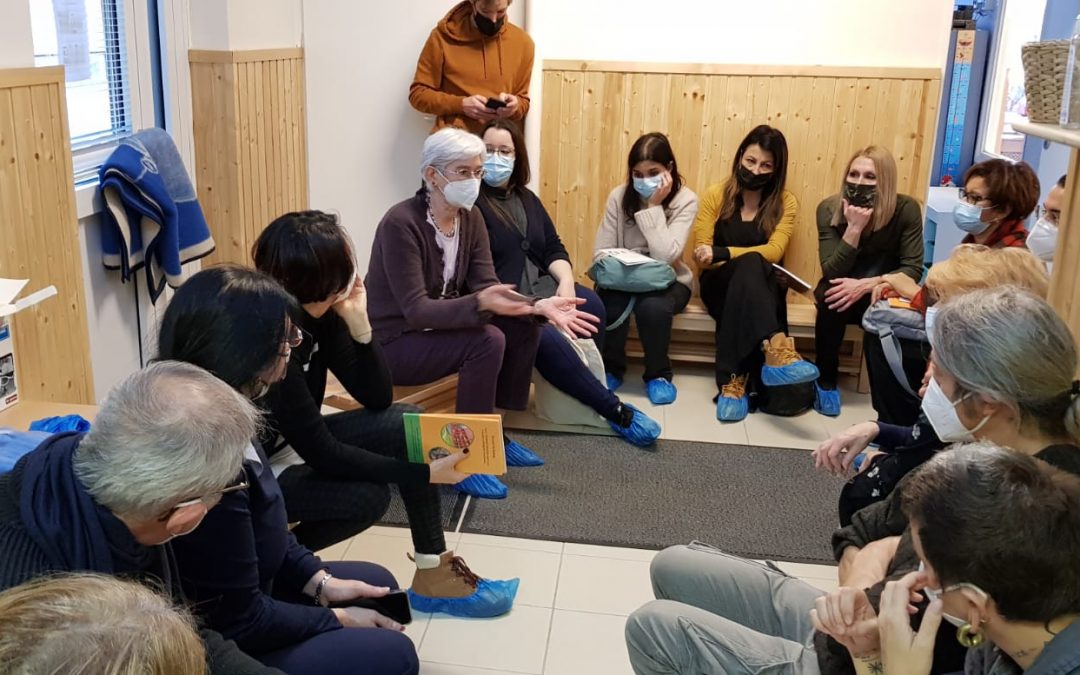
by Àngels Fusté | gen. 19, 2022 | General
A few days ago the Hungarian Lab EduKID 0-6 was presented in the framework of the Multiplier Event of the Erasmus+ Strategic Partnership “I.ECEC − Intercultural Early Childhood Education and Care”, a center for Discovery, Research and Documentation for Early Childhood Science Education.
The project is developed by JEB – Municipality of Budapest VIII District in cooperation with Galileo Progetti Nonprofit Kft, on the framework of the European Project the “Communities for Sciences – Project towards promoting an inclusive approach in science education” (C4S).
The participants were professionals of ECEC from Arca Cooperativa Sociale, and the Università degli Studi di Firenze from Italy, such as the training agency and social promoter Inforcoop Ecipa Piemonte from Turin, the Croatian nursery Dječji vrtić Srčeko and some of the C4S partners: the Erasmus Brussels University of Applied Sciences and Arts (EhB), and Wirtschaftsuniversität Wien (WU), together with Galileo Progetti Nonprofit Kft, and JEB, the host organisation.
The lab will be officially open in January for all the children and families of the local area.
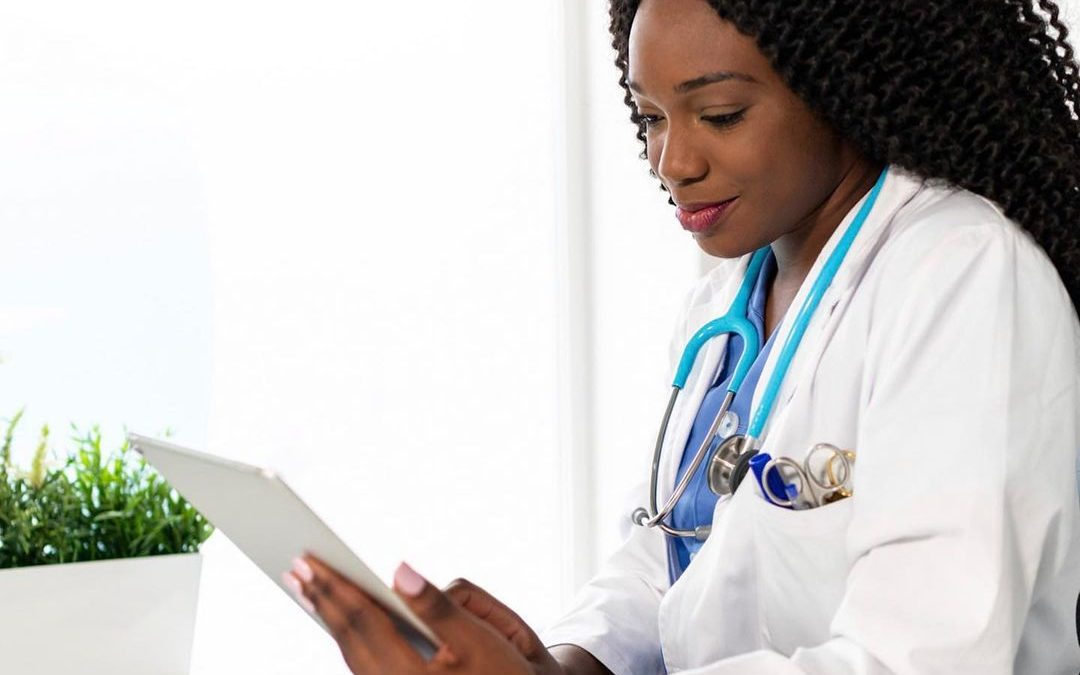
by Àngels Fusté | nov. 30, 2021 | General
Quinndy Akeju is a health expert, Afroactivist and coordinator of the community of black-African and afro-descendant people in the Basque Country (Spain). Nowadays, she is about to finish her Nursing studies.
1.- In your LinkedIn profile you define yourself as a Nursing student, Lecturer, Afro-activist, Dancer, Choreographer and Content Creator. As a profession you have chosen the science of care and being a nurse, something that you had clear since childhood. Could you tell us a little about it?
Yes, I chose care, the science of care, which is nursing. Something that was clear to me since I was little and, also, it was clear throughout my adolescence. Now I do realize that it arose from a need to put care at the center. I feel that, many times, in this society in which we grow up (I grew up in the context of the Spanish State) I feel that these issues have always been addressed, not only on health, but also extrapolating to other vital areas, from treatment and not from the care. If we look at the health system we see that it is built on the treatment of diseases. If your head hurts, I give you a paracetamol instead of, for example, prevent that headache (to know how to take care of ourselves to stop, so to not somatize this stresses and anxieties, for example with self-care), for example, if it comes from stress. We also see it in our interpersonal relationships. A very clear example is in the care of our interpersonal relationships, which is often overlooked. And speaking of, for example, a friendship, if something happens we always solve it. But have we ever considered how to take care of all the processes in which we are (with this friend or this person with whom we have woven a friendship) so as not to reach conflictive situations? Situations that are unavoidable but in which that conflict can have less intensity or impact.
We must claim care as the centre of our lives and I think it could result in an incredible social change.
2. Taking into account the scientific field of nursing in which you are currently, what do you think could generate more interest on a social level? or what do you think is most necessary to make it visible?
Regarding the scientific field of nursing, I believe that it would generate interest (or that there is a need) to make visible the role of care in certain groups. Care for people in certain situations, the majority (speaking of this context), in situations of vulnerability and in situations of difficult access to healthcare. Besides, I also believe it’s something that I think about a lot. As a student, I also believe that we should make use of other cares and not just the conventional ones that we have always been doing. The nurse bandages your foot, for example. How many times have we used music therapy? How many times have we used to care that does not come from the West, that also comes from countries of the so-called global south? Doing non-Western care I also think is important because in addition to having many benefits, many people are more comfortable using non-pharmacological methods or natural pharmacy methods, such as natural remedies, which are mostly non-Western and that would also raise the health level. Or, as it were, would build a much healthier and much more cared for society.
3. What was your experience learning science in school? What kind of science do you think girls and boys are learning today? Do you think is it enough? What is being left out of the curriculum that you consider important as learning?
I can say that my experience learning science in school was not very pleasant because in most of the classes, in biological sciences, for example (which was something that I opted for from a very young age), there was always a tendency to stereotype black people. We know that these stereotypes are born out of ignorance, because the black race, or races in general, do not have any biological basis, they are a social construct. The fact that black people were constantly stereotyped among other races and that I, on many occasions, was the only black person in the classroom, led me to somehow develop a kind of rejection of science because I grew up here; This was revoked in my adolescence when I built my identity and said: ” “Hold on! It’s enough!”
4.-As an Afro-descendant nurse, you are very aware of the racist stereotypes and barriers that we unconsciously (or consciously) incorporate during our education. You are working on the decolonization of thought and practice within medical and health teams. What does this work consist of?
These stereotypes are created, but something has to be done, someone has to be there also to deny them. And, in some way, this thing that happened to me should not happen, nor happen to the next generations. I think the type of science that boys and girls learn has evolved a bit, but it continues in the same line with respect to what I just said. And it becomes super necessary to include in the curriculum all these non-Western Sciences that, for example, come from other continents that are not taken into account in research studies. It is necessary to take into account all the representativeness and references in the Sciences of other continents, to make a conglomerate of all that, to learn that science has not only been built here. I think it becomes necessary to also recognize all the work that women and men who have been in the scientific field for many years have done, to show that science is also diverse, that in science there is a multitude of bodies, a multitude of ideologies, multitude of jobs. It is not only a question about the decolonization of thought and practice within health. I can say that it is simply about unlearning all these practices and ideologies that have been ingrained through medicine to harm. To harm in some way to people, in this case, Afro-descendants and Africans. We know that medicine has a very murky past with African and Afro-descendant people. From the experiments in which untreated syphilis was injected into black men, to the revered chief, and now called the father of modern gynaecology, Marion Sims, who performed open surgeries without anaesthesia in the uterus of black women. All this, although we may not believe it, has generated (this is a sensation), some stereotypes that affect the African population daily and in a very harmful way: Such as generating the idea that black people suffer less pain and have a much higher pain threshold than white people and that, therefore, in any intervention that is going to be done we are going to ignore the symptoms or we are going to tend to think that African people exaggerate their symptoms. Or even, for example, to ignore that the cultures and the beliefs and ethnicities of African people are themselves different. It is also something to reflect upon, the fact that ignoring the skin colour on many occasions is a factor to take into account especially in dermatological diseases. And I say this because on many occasions it is not taken into account, especially in Dermatology: we learn to distinguish between dermatological diseases, but always with white skin. And we forget that there are darker skin types that also suffer from dermatological diseases, but they manifest themselves in different ways.
To a large extent, we have to unlearn and relearn certain behaviours or ideologies that have been implanted by the history of medicine and science in order to carry out better care for people, in this case, Africans and Afro-descendants, into clinical practice.
5. In 2019, Zintia Álvarez Palomino published the first book in Spain that talks about the role of “Black Women in Science” and makes explicit the great contribution to science and humanity that these invisible women have made. From your experience and as a nurse, what can you tell us about the existence of female references in science in our society? Do you think you can become a role model for other young women?
I think that, generally speaking, there are very few female referents. That is, not that there are few, it is more that those that exist are not visible. And this occurs much more often with black women, because it is the invisibility of invisibility. I also think that, apart from all the urgencies that exist in science, a very important one is the visualization of female referents (and also the female African action) because many of us do not have them. I grew up without references in science, so I thought that I walked this path alone, and it is serious to feel that feeling of isolation at such an early age. It has a very, very large psychological impact (and I think it is of vital importance) seeing yourself reflected in certain referents. To welcome, to give shelter, in some way, to all generations of African girls and boys, Afro-descendants who want to enter science or who have the dream of entering science and who feel that, “Hey! I can do it!”. That, “look! she is here!” or “look at this girl here!”. It is urgent to put African women, and also African scientific men, on the map. I don’t know if I can become a role model, or not, and the truth is that there are people who consider me to be a reference, but I think it is very great for me. But the truth is that I myself, am building a path that people who have passed through here have already given me. People who have already been doing activism in science. Zinthia Álvarez Palomino is one of those people, with her book Black Women in Science. But I am walking and wherever that path takes me, it is welcome. Whether it is to become a role model or not (as if it is for anything) I really am there. I do my job and I am very happy to be able to continue here doing what I am doing and also incorporating different perspectives into scientific discourse.
6. From your personal perspective, what do you think science should have to be inclusive (avoiding invisible barriers and/or biases of a sexist, racist, colonial, empowering type, etc.)? What guidance would you give to teachers/educators when teaching in contexts of diversity?
I believe that science here has to open its ears and listen. To stop talking in some way and listen to people, to those female scientists who have been silenced for many years. And then incorporate everything heard into the discourse. And in this I include sexist, racist, colonial, capitalist, capitalist biases …, I include all kinds of biases and all kinds of systematic and invisible barriers that also worsen the quality of science. Because due to biases, there are mistakes, and those mistakes lower the quality of science.
I would tell the teachers to read about black women. I am talking about black women and men. But they should read about all these biases I mentioned above. Really, the male and female teachers are in a powerful position in which they will directly affect the lives of people affected by these biases. And it is vital that they know them and that they try to avoid reproducing, in some way, all the colonial dynamics that have been installed that, in the end, are perpetuated consciously or unconsciously. Ideally, you should be aware, that you know where it all comes from, and that from there you start working on it so as not to perpetuate it.
7-A name of a living scientist that you want to recommend to us and something you would like to add to finish this interview?
I want to recommend Taiwo Jennifer Akeju, she is a chemistry student who is working very hard, she is my sister, hahaha. She is a scientist who, to be honest, I admire a lot, I admire her a lot because she works hard, etc. She has amazing research papers in English and Spanish as well and I think all the work she puts in deserves recognition.
To end the interview, I would like to say that I am delighted that there have been proposals like this, coming from UManresa, proposals from the “Communities for sciences ”in which inclusivity is promoted, but a real one not a symbolic one. Because it gives me the feeling that, many times, when one speaks of inclusiveness, it remains as in words, and it does not materialize in acts or in anything that can cause a real change. Instead, these projects give me a feeling that I can finally have faith that things are going to change and with total positivity. Thank you very much for counting on me and I hope to continue working with you. A hug to all!
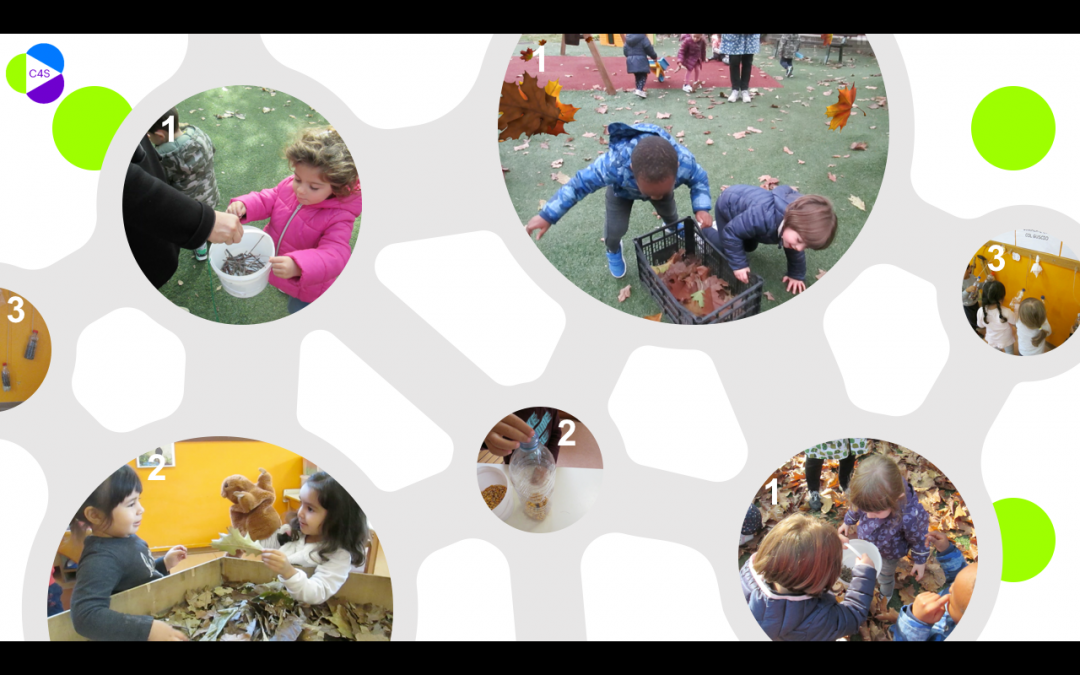
by Àngels Fusté | des. 9, 2020 | General
Roberta Garbo, who is a teacher at the Università degli Studi di Milano – Bicocca and a member of the Communities for Sciences (C4S) project leading group, held an interactive seminar on “Inclusive science teaching”. It was on 4th December 2020 during the International Days organized by Erasmus Brussels University (EhB) on the subject “Transversal skills for the 21st Century”.
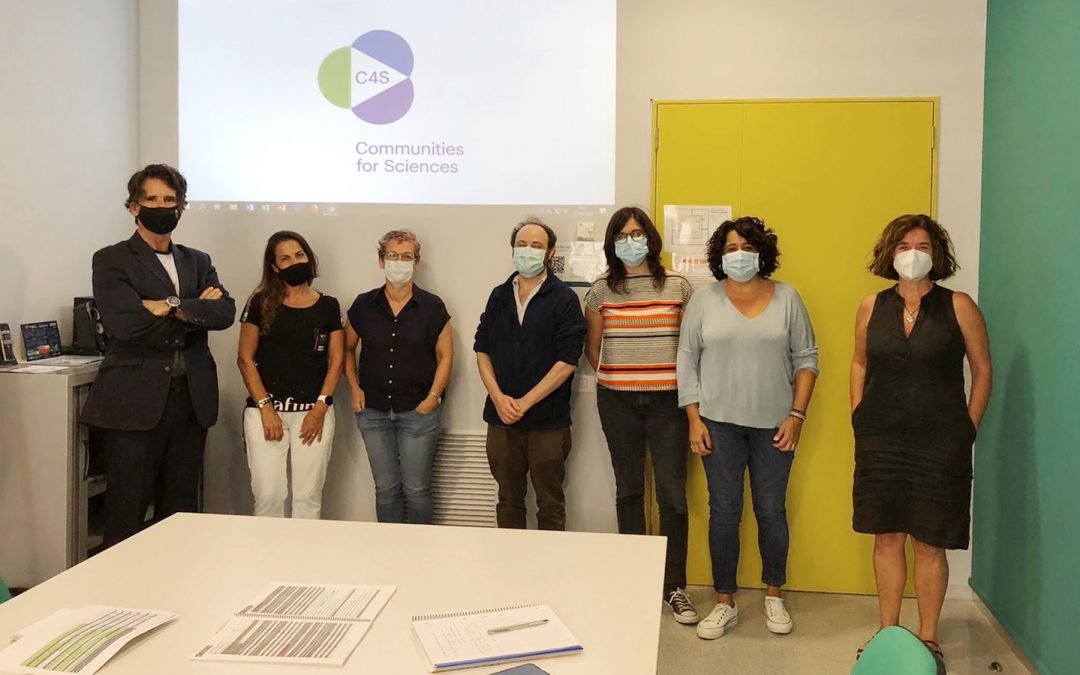
by Àngels Fusté | nov. 23, 2020 | General
Interview with Salvador Simó, Berta Vila and Francesca Davoli from Vic Campus (UVic-UCC)
Science education is one of the essential tools for advancing the social and cultural inclusion of children and young people. This is the main pillar on which the project “Communities for Sciences – Towards promoting an inclusive approach in science education” (C4S) is based, whose principal aim is to make science education more inclusive.
.- In a few words, how can we define inclusive science?
This is a science for, from and in favour of society: a science which excludes nobody on the basis of gender, age, race, sexual orientation, etc.
Like any other fields of knowledge, science must be accessible to everyone. The idea that there are “scientific minds” or “artistic minds” or subjects that are impossible for some people, is not true. This has been shown by neuroscience in recent publications or as demonstrated by Gómez-Motilla, C. and Ruiz-Gallardo, J. R. (2016)[1] in their study regarding gender issues which affect the interest in science in early childhood education. Therefore, science must be considered as a tool of inclusion and equity, in the sense that it allows the mind, the person and their intellectual autonomy to be developed.
From the field of research, we must move forward to place science in an inclusive, two-way paradigm. The first way is to increase the access which everyone has to science. The second one is to give visibility to minority groups, which are sometimes excluded, and to consider them as relevant scientific references.
.-What is the scope of the UVic-UCC Hub within the Communities for Sciences? How will the knowledge generated positively affect the development of the project?
On the one hand, we will work to prepare primary school children (from 6 to 12 years old) for an Economy 4.0, a term that economists have also coined as the Fourth Industrial Revolution, a period in which we are already immersed. This is based on new technologies such as 3D printing or virtual / augmented reality as well as robotics.
One of the consequences of Economy 4.0 is the disappearance of millions of traditional jobs and the emergence of new employment niches based on this new economy. In this sense, people who do not have technological skills will be excluded from this new job market and, therefore, will be in danger of social exclusion.
Our programme is based on generating knowledge on how to prepare school children in a situation of marginalization to meet the challenges of Economy 4.0 despite currently not having access to these skills.
In the field of early childhood education, it is a matter of taking a different approach to the current one. In some preschool classrooms, science is often a sporadic and residual activity, although it is known to develop very relevant cognitive activity.
Both in the first cycle (children aged 0-3 years old) and in the second one (children aged 3-6 years old) students, and especially their families, must perceive that they are perfectly capable of doing science and thinking scientifically.
Our programme seeks to develop the socio-cognitive skills of all girls and boys, and to share with their families this perspective concerning the possibilities of their children. Access to knowledge and a positive self-image guarantee equality.
The objective is to facilitate the development of critical, analytical, creative and autonomous thinking. This part of the project will serve as a scaffold for the first one, as they will be interconnected.
.- What are the greatest challenges you are facing?
There are many different challenges. On the one hand, the importance of raising awareness in the families of young children that working with them and their children is of paramount importance and that science can be a factor to foster inclusion and awareness.
On the other hand, the difficulty of reaching a large group. Luckily, the project covers many institutions, both national and international, and is three years long, which makes it transversal. However, research only makes sense if it is outreaching and has a positive effect on society. This part is covered in this project, but it is always a complex task to reach different schools and especially the families, some of whom are not at all close to academic fields.
Inclusion, a theoretically accepted concept, is a challenge in itself because we are in the process of implementing the idea of schools belonging to and aimed at everyone, as prescribed by the new Decree 150/2017, of 17th October, on education for students within the framework of an inclusive educational system [2].
In fact, according to Stainbak (2001)[3], inclusive education is a process through which all children, regardless of ability, race or any other difference, are offered the opportunity to become members of ordinary classrooms and learn from and with their peers, in the classroom, all together.
It also alludes to aspects of social exclusion concerning children who do not have the technological skills needed for an Economy 4.0. This reality condemns them to unemployment or precariousness in the context of an Economy 4.0.
.- This is the first time that the two UVic-UCC campuses, UVic and UManresa, have joined forces to take part in a European project of this nature. What are your expectations for this new experience?
We believe it will be a great two-way learning experience shared with all the participants, which will help strengthen our UVic-UCC University Federation.
Working closely for three years with many other international ‘partners’, who bring different perspectives and backgrounds, will allow us to delve deeper into some current educational issues at a European level, as well as being able to improve the educational level of various countries. It will be very advantageous to weave this network of collaborations, not only within our own territory, but also with very different realities which are geographically far away. The cooperation with UManresa, which is leading the project, is a way to consolidate the relationship between the two campuses and to be able to guarantee and share the specific characteristics of each one.
This collaborative relationship will accompany us in the different phases of research in order to extend this inclusive scientific approach to other contexts and communities.
.- Do you have the support of other institutions? What means do you have?
The schools are our great allies. Obviously, without the teaching staff and the complicity of teachers and children, research is not possible. The families are equally important in this aspect.
Town halls must also be able to participate in the changes, be informed, collaborate and be co-responsible because, after all, education forms a part of politics. For this project we have the support of Vic Town Hall and the collaboration with different schools in the city: the Santa Caterina/Dominiques-Vic School, the Dr. Salarich School and the El Remei Municipal Family Centre.
In addition, we also have a wide network of teachers, educators and professionals in the field of education interested in research and investigation, who will provide us with support in the different phases and programmes which take place during the three years of the project.
The team is made up of UVic-UCC researchers, experts in the fields of education and social inclusion: namely, Francesca Davoli, Berta Vila and Mireia Canals (Faculty of Education, Translation and Human Sciences) and Salvador Simó (Faculty of Health and Welfare Sciences). The team will also be made up of other professionals who will collaborate on the project.
.- How do you envisage that C4S can contribute to promoting social inclusion through new technological opportunities?
Mastery of new technological skills will be the key for accessing the future job market, therefore it is essential to focus on the way they can be acquired from the preschool stage. However, inclusion is not just fostered through technology. Education is constructed through contexts, people and relationships, knowledge, skills and competencies and, consequently, value must be given to the actions and thoughts of each child, and their ways of learning. It is understood that this is the way to contribute to their own construction and development as a person in relation to the rest of the group, children and adults, teachers and families. From early childhood education to the other formative stages, if girls and boys are recognized as capable beings and accompanied by educators who believe in their potential, they will be able to develop those attitudes and skills necessary to grow and act in contemporary and future society. As Dr. Echeita succinctly attests, “Dreaming of inclusive education for everyone is not a utopia but a path to follow.”
[1] Gómez-Motilla, C., & Ruiz-Gallardo, J. R. (2016). El rincón de la ciencia y la actitud hacia las ciencias en educación infantil. Revista Eureka sobre enseñanza y divulgación de las ciencias, 13(3), 643-666.
[2] https://dogc.gencat.cat/ca/pdogc_canals_interns/pdogc_resultats_fitxa/?action=fitxa&mode=single&documentId=799722&language=ca_ES
[3] BRAY STAINBACK, S. “L’educació inclusiva: definició, context i motius”. Suports, 2001, vol.5, núm.1, p. 18-25.

